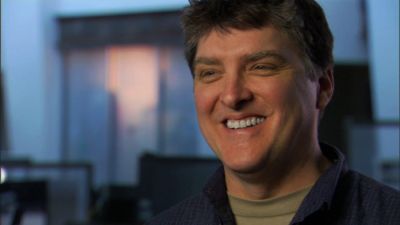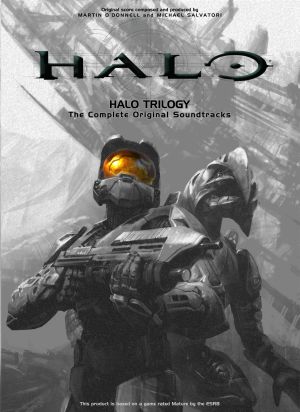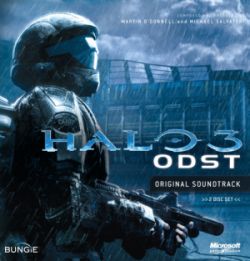|
Versión en español

If you don't know already Marty O´Donnell, maybe we can clear up your mind with just a word: Halo.
Marty is ths sound director of the developing studio responsible of Halo, the American enterprise Bungie. He is also the co-composer of the scores for this saga (except Halo Wars), next to Michael Salvatori.
Halo is without any doubt the Star Wars of videogames. In the first week after it was released, Halo 3 gained more than 300 million dollars, being by now the best seller item in the history of entertainment industry, even more than blockbusters like Spider-Man 3 or Harry Potter's last book.
So you can imagine how proud we are that Marty granted us some minutes of his time, after the CD edition release of the last Halo videogame, Halo 3 ODST.
BSOSpirit: Let's travel back in time. What are your recollections of your work on video games such as Myst or Myth?
Marty O´Donnell: Well I didn’t work on Myst but I worked on its sequel Riven. I really enjoyed working on that game although I had a lot to learn about interactive audio in 1997 since that was the first game for which I produced audio. I ended up working with Bungie on Myth soon after starting Riven. They both shipped in October of that year which was quite an accomplishment for our little studio, TotalAudio.
 BSOSpirit: Did you ever think then that you'd become a renown composer in the video games' arena as opposed to film or TV? BSOSpirit: Did you ever think then that you'd become a renown composer in the video games' arena as opposed to film or TV?
MO: Most of my scoring work came in commercials and industrial films. I wasn’t expecting to become renown in any arena.
BSOSpirit: When you first accepted the assignment to write music for Halo could you ever imagine that the game and your music would end up being so highly successful?
MO: Working with Bungie made me a fan of the team that made their games. I really believed that Halo was just about the coolest thing I’d seen in a video game and I imagined that it was going to be wildly successful. I just hoped that the music would hold up to the rest of the project.
BSOSpirit: How has your background as a sound designer helped you understand what's the best musical layer for each character and situation of Halo's vast universe?
MO: As Audio Director on a game I believe that I’m responsible for everything that comes out of the speakers; dialog, sound effects, background sounds, music, game event sounds, and how all these things mix together. During the creation of all these parts I’m aware of how they might interact and that informs many of my decisions about the kind of content we make. In the past, in film and TV, I’ve worked as only the sound designer, or only the composer, and when I listened to the final mix I could hear things that conflicted rather than complimented. When one person carries the vision for the whole audio landscape I believe it turns out better. We’ve got plenty of incredible talent on our audio team and I need to insure that everything fits together.
BSOSpirit: One of the first things that struck me from your score to Halo was the fact that your music is no shy in references to the electronic music of the 80s' and 90's; a feature that you still use in the latest scores from the saga. Do you think this has somewhat helped you develop your own distinct trademark nowadays that video game scores seem to rely heavily on large orchestras and choirs?
MO: I write music that I enjoy writing. I don’t try to reference any particular genre or time period. If you hear things that sound like the 80’s or 90’s it’s probably because I wrote a lot of music during those decades and it’s just part of my style.
BSOSpirit: How did you come up with the idea of using Gregorian chants for your score? This is highly unusual for a Sci-Fi epic tale which rather seems to be associated to the likes of Vangelis' Blade Runner or John Williams' Star Wars.
MO: Once again I did what I thought might work for the emotional response we wanted to evoke from the audience. I didn’t consciously dwell on what other composers have chosen to do in their work, although I’m certainly influenced by everything I’ve ever heard, so in this particular case I tried to imagine what sort of music would evoke a sense of “ancient” – and that turned out to be monks.
 BSOSpirit: Halo is known for taking its players to open spaces as opposed to games like Doom where narrow and dark gangways are their trademark. Has this inspired you to write a large-scope score against what's so common in current video games? BSOSpirit: Halo is known for taking its players to open spaces as opposed to games like Doom where narrow and dark gangways are their trademark. Has this inspired you to write a large-scope score against what's so common in current video games?
MO: I love creeping along narrow, dark passages and I write music for that. From the beginning Halo also had huge vistas with rolling hills over which you could drive or fly a cool vehicle. I wrote music for that too. I don’t write music as a response to what other video games have, but rather as a response to what exists in the game I’m working on.
BSOSpirit: How did it feel to be presented with the Best Original Video Game Soundtrack by the prestigious Rolling Stone magazine?
MO: That felt fantastic. It’s really gratifying to have work validated by a publication that I grew up reading. I also like the fact that Rolling Stone is a music magazine and not a video game magazine.
BSOSpirit: Was it you who made the concert arrangements for Halo? How was the experience of having your music performed at Video Games Live?
MO: Tommy Tallarico and Jack Wall are the creators of VGL. I’ve been friends with both of them for years and was thrilled that they’ve included Halo music in their concert tour. It’s a blast to hear this music performed live in a concert hall.
BSOSpirit: Have you ever thought of making a whole concert devoted to the Halo universe?
MO: Yes. We would love to do that sometime in the future.
BSOSpirit: Halo 3 ODST is an adventure in the Halo universe but without the Master Chief. It's true that the previous soundtracks didn't focus on just one character but, in any case, is this circumstance now having a bearing on your music?
MO: Yes, but mainly because it’s a new story with new characters. There’s really no reason to have any previous themes show up in ODST.
 BSOSpirit: Where does Halo 3 ODST innovate in relation to the previous scores? BSOSpirit: Where does Halo 3 ODST innovate in relation to the previous scores?
MO: We’ve expanded the use of music into the Firefight mode of multiplayer. Up until ODST we’ve never used music in multiplayer games. There are also some non-linear exploratory elements that caused me to rethink how music is triggered and effected.
BSOSpirit: We have realized that the tone of this latter game is closer the film world. Have you also tried to follow this approach in your music?
MO: I’m not sure I agree with your premise. The Halo trilogy seemed to be close to the tone of space opera films whereas ODST is closer to the tone of film noir. In any case, I’ve tried to write music that feels right for the noir atmosphere.
BSOSpirit: Will you reprise some of the themes of the previous scores? What about the instrumentation?
MO: The instrumentation is similar in many ways, but I’ve also relied on small jazz-type ensembles in addition to orchestra. There’s a bit more electric guitar, piano, and of course (for the first time in Halo) saxophone.
BSOSpirit: As it was the case in Halo2 can we expect to find a memorable new theme like "Unforgotten"?
MO: There are plenty of new themes in ODST. How memorable they are remains to be seen.
BSOSpirit: All the creatives say this last Halo game features your best score to date. Do you share this view?
MO: I would love that to be true, but I’m too close to the music to make that sort of judgment. It would be great to be able to have your latest work always be your best.
BSOSpirit: What can we expect from the 2 hours soundtrack release?
MO: 17 suites arranged in a way that matches one potential play-through of the campaign. Of course there are several ways you could play and individual pieces of music change based on your in-game choices but I have to freeze in place one version for the soundtrack.
BSOSpirit: Since there's always talk about a potential film based on Halo do you think there's anybody more suited than you to do the job?
A: There are better and more experienced film composers out there but I like the way you think. I am better suited than anyone else!
BSOSpirit: What other projects you have? Where do you want your career to take you in the future?
A: Right now I’m pretty happy being a partner at Bungie. Directing audio and composing music here is plenty of work. We’re working on some new creative directions for the studio that is really exciting. I guess I’ll just see where that takes me
Interview by David Doncel
Translation by Sergio Gorjón.
|





